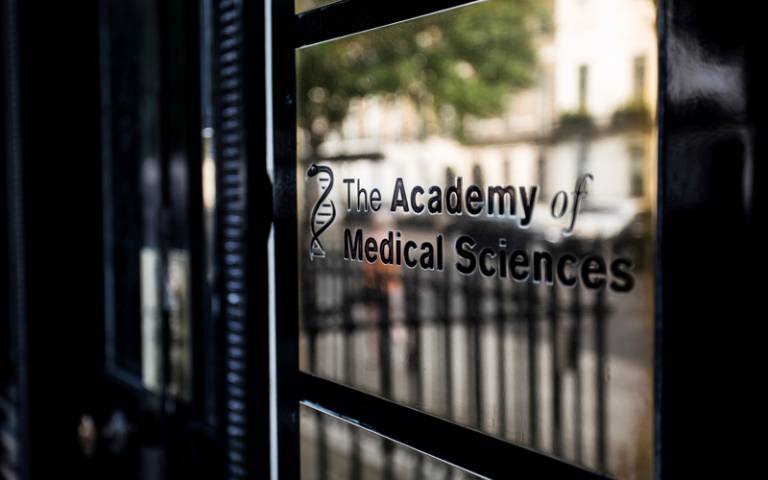Nine UCL academics elected to Academy of Medical Sciences
14 May 2020
The fifty newly elected Fellows of the Academy of Medical Sciences (AMS) includes nine academics from UCL, in recognition of the incredible contributions they have made to medical science.

These Fellows have been chosen for their outstanding efforts in the field of biomedical science, including national science engagement and communication programmes, research discoveries and translating scientific advancements into benefits for public healthcare.
The academics from UCL are:
Professor Ibrahim Abubakar (UCL Institute for Global Health)
In addition to his role as Director of the UCL Institute for Global Health, Prof Abubakar’s work focuses on the epidemiology, prevention and treatment of infections including hepatitides, tuberculosis, HIV, as well as antimicrobial resistance and vaccine-preventable diseases among underserved populations.
Professor James Bainbridge (UCL Institute of Ophthalmology)
Having performed the world’s first gene replacement surgery for inherited blindness, Professor Bainbridge’s aim is to reduce blindness by developing new treatments for retinal diseases.
NIHR Professor Paolo De Coppi (UCL Great Ormond Street Institute of Child Health)
Professor De Coppi has a special interest in congenital malformations and has focussed his research interests on stem cells and tissue engineering, trying to find new treatment modalities. He descibed the presence of stem cells in the amniotic fluid and pioneered regenerative medicine applications in children.
Professor Diana Gibb (MRC Clinical Trials Unit at UCL)
Having coordinated multi-country paediatric HIV trials across Europe, Thailand and South America since the 1990s, Professor Gibb’s research examines tuberculosis, malaria and antimicrobial resistance, with a focus on the suitability of children’s medicines to the setting.
Professor Alison Lloyd (MRC Lab for Molecular Cell Biology at UCL)
Professor Lloyd’s research focuses on peripheral nerve biology, the multicellular complexity of nerve regeneration and the links between these processes and cancer.
Professor Emma Morris (UCL Infection & Immunity)
Professor Morris’s research involves the testing of genetically modified immune cells and stem cells in patients with haematological malignancies (blood cancers) or inherited immune deficiencies. She has also pioneered the use of allogeneic BMT for adults with immunodeficiency.
Professor Rosalind Raine (UCL Epidemiology & Health)
Professor Raine’s research designs and evaluate complex health care/population health intervientions and policies. She has a particular interest in strategies which reduce the social gardient in the use of health care/population health.
Professor Mary Reilly (UCL Queen Square Institute of Neurology)
Professor Reilly’s research is focussed on the inherited peripheral neuropathies including gene identification and studies into pathogenesis, natural history studies, development of outcome measures and conducting clinical trials.
Professor Bart De Strooper (UK Dementia Research Institute at UCL)
Professor De Strooper’s research aims to understand the mechanisms which fundamentally underlie Parkinson’s and Alzheimer’s disease.
Commenting on UCL’s nine new AMS Fellows, Professor David Lomas, UCL Vice Provost (Health), said: “I am delighted that so many colleagues have been elected to the highly respected Academy Fellowship. The new UCL affiliated members have each made outstanding contributions to biomedical science and these fellowships are well deserved recognition of their remarkable work.
The range of disciplines represented, from global health to paediatric surgery, is testament to the quality and breadth of the work being done across the UCL School of Life and Medical Sciences. I am immensely proud.”
Professor Sir Robert Lechler PMedSci, President of the Academy of Medical Sciences said:
“I am delighted to welcome these 50 new Fellows into the Academy’s Fellowship. Each one has made their own outstanding contribution to biomedical science, and together they are advancing the health of our society in the UK and internationally. Their work affects us all, from the way we keep healthy through our lifestyle, to how we are treated if we become ill, to the way we receive information about health.”
The new Fellows will be formally admitted to the Academy on 25 June 2020.
Links
- Professor Ibrahim Abubakar’s academic profile
- Professor James Bainbridge’s academic profile
- Professor Paolo De Coppi’s academic profile
- Professor Diana Gibb’s academic profile
- Professor Alison Lloyd’s academic profile
- Professor Emma Morris’s academic profile
- Professor Rosalind Raine’s academic profile
- Professor Mary Reilly’s academic profile
- Professor Bart De Strooper’s academic profile
- UCL Applied Health Research
- UCL Developmental Biology & Cancer
- UCL Neuromuscular Diseases
- UK Dementia Research Institute at UCL
- UCL Division of Infection & Immunity
- UCL GOS Institute of Child Health
- UCL Institute of Clinical Trials & Methodology
- UCL Institute of Epidemiology & Healthcare
- UCL Institute for Global Health
- UCL Institute of Ophthalmology
- Lab for Molecular Cell Bio MRC-UCL
- MRC Clinical Trials Unit at UCL
- UCL Queen Square Institute of Neurology
- UCL Faculty of Brain Sciences
- UCL Faculty of Life Sciences
- UCL Faculty of Medical Sciences
- UCL Faculty of Population Health Sciences
Image
Credit: Big T images for Academy of Medical Sciences
 Close
Close

